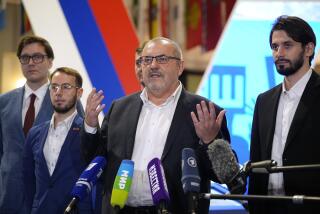Anti-Kremlin Bloc to Be Led by Primakov
- Share via
MOSCOW — Russia’s most popular politician, former Prime Minister Yevgeny M. Primakov, took a widely anticipated first step Tuesday toward a presidential bid by announcing that he has agreed to lead a powerful anti-Kremlin electoral alliance.
Primakov’s decision to throw his formidable political weight behind the Fatherland-All Russia movement is a challenge to both the Communists, who dominate parliament, and President Boris N. Yeltsin, who wants new Prime Minister Vladimir V. Putin to become Russia’s next president.
Primakov insisted that his decision to head the bloc does not mean he has decided to run for president. Instead, he said, Fatherland-All Russia will focus its efforts on December’s elections for parliament and only afterward turn its attention to June’s presidential ballot.
“As regards presidential platforms, ambitions and so on, I hope that we are not thinking about that now,” Primakov told a news conference. “Our main aim right now is different. Our goal is to do everything to ensure that our bloc . . . will dominate or at least occupy a worthy place in the state Duma,” he said, referring to the lower house of parliament.
The announcement ended a tortuous courtship between Primakov and Fatherland-All Russia, a coalition formed two weeks ago by Moscow Mayor Yuri M. Luzhkov and a group of regional governors. Analysts have predicted that with support from Primakov, Fatherland-All Russia--already a popular centrist movement--will sweep the elections.
“The electoral success of the bloc to a large extent directly depended on Primakov’s decision to join,” said Nikolai V. Petrov, a political analyst with the Carnegie Moscow Center. “Now that Primakov has given his consent, its chances of success have soared.”
Polls show that Primakov, a 69-year-old former diplomat and intelligence chief, is Russia’s most trusted politician. In a recent survey by the respected Public Opinion Foundation, 57% of respondents said they trust him.
The polls also show that at least so far, Primakov is the only potential presidential candidate who would trounce Communist leader Gennady A. Zyuganov in a runoff ballot. The Public Opinion Foundation shows Primakov winning 49% to 21%.
Primakov appears to feel his popularity is a responsibility. “I can tell you without holding anything back that I have taken no decision about [running for president],” Primakov added. “A lot will depend on whether I feel the trust of the people, on which I place great value.”
The reasons for Primakov’s popularity can be obscure to outsiders. He is a corpulent man with a flabby face who frequently has trouble enunciating words.
But to a country weary of Yeltsin’s power games and erratic leadership, Primakov appears to be a kindly, steady grandfather figure. In the eight months he served as prime minister, ending when he was fired by Yeltsin in May, he took few policy initiatives but somehow managed to restore economic stability.
“People love Primakov,” said political analyst Andrei A. Piontkovsky of the Independent Institute for Strategic Studies. “For a long time this was a mystery until an opinion poll revealed that the most popular Soviet leader was Leonid Brezhnev with his era of stagnation. Primakov is the Brezhnev of our time. He is even starting to look and talk more and more like Brezhnev every day.”
Since its formation, Fatherland-All Russia has been steadily attracting support. So far it has been joined by the Communists’ former allies, the Agrarian Party, and some members of a second group of centrist governors known as Russia’s Voice.
As part of the deal to bring him on board, Primakov said, he won pledges from Fatherland-All Russia to support placing curbs on presidential power and reestablishing the post of vice president. Such changes in effect would rescind powers Yeltsin acquired when he pushed through a new constitution in 1993.
Primakov’s decision to take the top job with Fatherland-All Russia knocks Luzhkov down to second place in its leadership. Luzhkov has been touted as a presidential candidate, though his popularity outside Moscow is far weaker than Primakov’s.
Observers say the alliance’s apparent goal is for Luzhkov to serve as prime minister in a Primakov presidency that would reduce the president’s powers and put most daily control of the state in the prime minister’s hands.
Meanwhile, Yeltsin and his advisors are trying to cobble together an election bloc to support Putin, who was confirmed as prime minister Monday.
Putin is a member of Our Home Is Russia, the party formed to push Yeltsin’s 1996 reelection. The party has held so-far fruitless talks about forming an alliance with other liberal-oriented parties.
If a liberal bloc should form, Russia’s fractured political landscape will have sorted out into three loose groups: the socialist-leaning but anti-Communist Fatherland-All Russia; a Kremlin-backed liberal alliance; and die-hard Communists allied with a handful of hard-line fringe groups.
*
Sergei L. Loiko of The Times’ Moscow Bureau contributed to this report.
More to Read
Sign up for Essential California
The most important California stories and recommendations in your inbox every morning.
You may occasionally receive promotional content from the Los Angeles Times.













